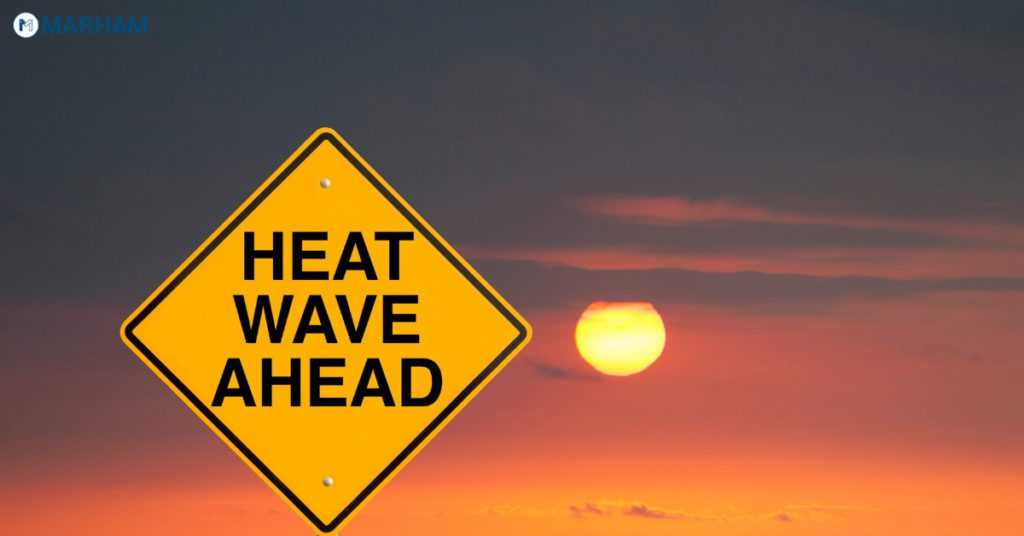“Global Warming is the Global Warning” – An inconclusive debate that has captured various climatologists, meteorologists, and environmental scientists’ attention from all over the world. According to United Nations Framework Convention on Climate Change (UNFCC), our earth temperature has risen at an average rate of 2 °C F or 1.1 °C per decade which is alarming. That’s why over the past few years, extreme heat occurrences are becoming more common. The year 2020 was the warmest year recorded by the National Oceanic and Atmospheric Administration (NOAA). This sudden rise in temperature affects the normal balance/homeostasis of the human body and creates grave health effects. World Health Organization (WHO) also reported that from 1998-2018, around 166,000 people have died due to these continuous heatwaves.
Heatwave Effects On Health
Your health is at risk if extreme heat persists for a longer period of time. The most obvious and immediate effect you can experience is in the form of Heatstroke.
1. Heatstroke
Heatstroke is a health condition triggered due to overheating of your body. It is most commonly observed in the summer season when the scorching heatwave raises to 40°C/104 °F or higher. It is required to be treated urgently, otherwise, it may directly damage your heart, brain, kidneys muscles and even cause death.
Early Warning Signs To Spot A Heatstroke
If someone starts to show any signs of heatstroke, you should immediately get them out of the heat and into a cool/shady place. Apply ice packs or wet towels to their face, armpits, back, and neck. However, you may as well detect these early warning signs to avoid a medical complication:
- High body temperature
- Nausea
- Dizziness
- Alteration in sweating
- Headaches
- Dehydration
- Muscle cramps
- Stopped sweating
- Dark urine
Serious Symptoms Of A Heatstroke
Serious heatwave effects on health may vary from person to person. Children, pregnant women, elderly folk, and individuals with pre-existing cardiovascular diseases are at a higher risk. Likewise, if anyone experiences any severe symptoms, they should seek immediate medical help. The most dangerous symptoms of heatstroke may include:
- Increase breathing rate
- Vomiting
- Altered mental state or unconsciousness
- Skin redness or dryness
- Dilated pupils
- Seizures
- Confusion
- Disturb body homeostasis
- Irrational behavior
If you notice any of these symptoms, immediately consult a cardiologist.
2. Heart Problems
Your heart plays a huge role in keeping your blood at normal cool. It helps you to radiate heat by letting the blood flow through your veins and arteries. Extreme heat pressurizes your cardiovascular system which leads to developing high blood pressure. You can find the best cardiologist to consult with if you are having heart problem.
3. Increase Respiratory Issues
The summer season also aggravates the air pollution load, creating breathing issues. Asthmatic patients and those who already have lung problems are likely to suffer more when a heat stroke transpires. Extremely high temperatures can also disturb the ozone levels, consequently harming the lung tissues.
4. Rhabdomyolysis
Rhabdomyolysis is a serious health condition linked with heat stress and prolonged physical exertion, leading to muscle rupture. Sometimes, it can be fatal to the human body and may cause permanent disability. When a muscle dies, proteins and electrolytes enter into the bloodstream that can damage the heart and kidneys, and even cause immediate death.
5. Skin Diseases
Humidity accelerates the body’s heat index which creates a lot of skin problems. Severe dehydration damages your skin in the form of a heat rash. Generally, heat rashes seem like a small red cluster of pimples or sorts of blisters and can appear on the face, neck, and hands.
Due to excessive sweating, loss of water, minerals, and salt your body easily get exhausted and you feel your skin and lips drier. Therefore, dermatologists recommend using good-quality sunscreens or sunblock lotions to protect the skin from harmful radiations. If you’re already experiencing these skin issues, it is time to consult with the best dermatologist in Lahore or any other city in Pakistan. For more details, book an online appointment through MARHAM.PK.


What Are The Precautions We Need To Take?
According to Pakistan Meteorological Department, dry weather conditions and intense heatwaves are expected to start this month. Provincial Disaster Management Authority (PDMA), further confirms that those living in urban areas might have more heatwave effects on health than those living in rural areas. As has been observed, heatwaves are causing more deaths than any other weather-related disaster and by taking these preventive measures we can protect ourselves and our loved ones’ health:
- Avoid maximum sun exposure
- Drink plenty of water and keep yourself extra-hydrated
- If going outside is a necessity, use umbrellas or sunscreens
- Avoid eating spicy meals
- Don’t drink too much caffeine
- Cover your face or wear a scarf when you go outside
- Don’t go for walks/exercise especially in the daytime
- Wear clothes with loose-fitting
- Daily take a bath
- Take regular breaks if you work outside
- Don’t leave your children inside a closed space
- Plant as many trees as you can
Check out: 7 Top Tips to Stay Safe from Heat Stroke
First Aid
In case of a heatstroke emergency, you can follow these first aid tips which include:
- Sit or lie down in a cool place
- Start taking deep breaths
- Slowly drink water or juices
- If you already have heart problems, avoid consuming salts
- In worst cases, seek medical care immediately

